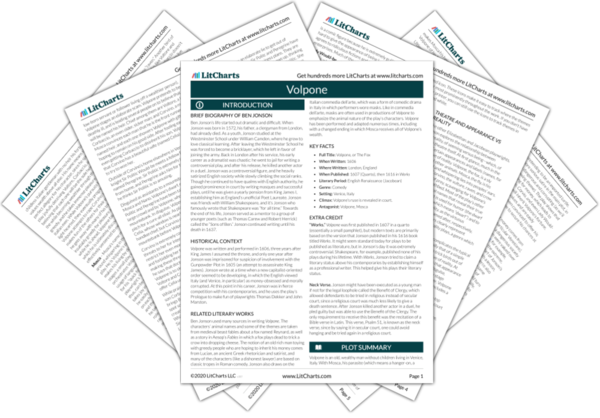Summary
Analysis
Corvino, with a sword in his hand, drags Celia into a room of his house. He shouts that his honor has been lost, and he is furious that Celia interacted with such a foolish mountebank at a public window. He laments the mountebank’s overacting and the terrible sales pitch for his elixir, shocked that Celia seemed to enjoy it. He asks if the mountebank was like a whistle used to train falcons, or if Celia was enamored by his ridiculous clothing. He accuses her of wanting to have sex with the mountebank, and says that if she does he’ll leave her and retain her dowry. He calls her a whore and says that she gravely underestimated the way he would react. He says that for justice, her actions should be followed by the murder of her entire family.
Corvino’s treatment of Celia is based on the stereotype that Italian men were controlling of their wives, but this depiction is extreme in its severity and its violence. Jonson’s imagery of the mountebank as a falcon tamer was a common contemporary trope used to describe relationship dynamics: men had the authoritative “taming” position over women. Part of this authority was the ability to leave a marriage with the dowry if the woman was unfaithful. Corvino’s call for the murder of Celia’s family is an extreme overreaction, evidence that he is corrupted by his jealousy and his greed for money.
Themes
Literary Devices
Celia tries to calm Corvino down, but she’s unable to. He asks her what she could suggest as punishment for acting so dishonorably, and he threatens to stab her with his sword the same number of times she stabbed the mountebank with her lustful eyes. She says that she didn’t think being at the window would upset him so much, but he is furious that she tried to have a conversation with a stranger in front of a crowd. He says that she purposely reached out with a handkerchief, which would probably generate a letter in response telling her where to meet for sex.
Again, the threats Corvino makes are excessive and extremely violent, and the juxtaposition of Celia’s completely reasonable behavior makes them seem all the more absurd. The threat to stab her with his sword contains a connotation of sexual violence, which is bitterly ironic, considering that he is upset with her for an imagined sexual transgression.
Themes
Celia pleads that she never acts inappropriately and she says she only leaves the house infrequently to go to church. Corvino responds that now she’ll be even more restricted, saying that his previous rules will seem like freedom compared to what he’ll enforce now. He says the window will be blocked and she will be required to stand behind a line three yards away from it. If she crosses the line and gets too close to the window, even by accident, he’ll rain down hell and horror on her. He then hands her a chastity belt and says he’ll keep her in the back part of the house, and that everything about her will be backwards and without pleasure. He tells her that her “open” behavior forces him to act this way.
When Corvino references to the back part of house and uses the word “backwards,” he is making puns on anal sex. This is, again, a horrible irony, since it’s Corvino—not Ceila—who seems obsessed with sex, contrary to his accusations. Celia’s desire to go to church is also juxtaposed with Corvino’s promise to rain down hell if she disobeys. Celia’s name means heaven, and she is aligned with heaven, religion, and moral righteousness in the play.
Themes
Literary Devices
Corvino is interrupted by a knock, at which point he tells Celia to go away and hide herself in another part of the house away from windows. If she disobeys, he says, he’ll dissect her publicly for anatomical research. Celia exits, and a servant enters saying that Mosca has come to visit.
In another gruesome threat, Corvino evokes the fear of doctors by saying that he’ll perform a public dissection like doctors might perform autopsies.
Themes
Get the entire Volpone LitChart as a printable PDF.













